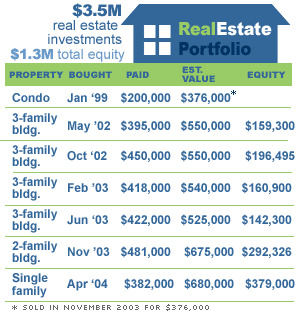
BEND, Ore. (CNN/Money) -
Matthew Martinez was working as the director of international business development at Internet company Terra Lycos in 2001 when he got a business idea of his own -- pool investors' money and buy apartment buildings in the Boston area.
"I created an 82-page business plan for what I wanted to do and pitched it to everyone I knew with money," said Matt, now 34. "I couldn't find anyone to invest."
So on a much smaller scale, he decided to go it alone, setting his sights on three-family buildings in Dorchester, a Boston neighborhood.
About that time, as luck would have it, Matt befriended a seasoned real estate investor who was buying a unit in the building where Matt lived.
"We hit it off, and he took me under his wing," said Matt.
Three years later Matt has $1.3 million worth of equity in five multifamily buildings in Dorchester and one single-family rehab in the well-to-do Boston suburb Wellesley.
Better yet, his rental income yields enough cash that Matt quit his day job in April to be a full-time landlord.
Here's how he turned an 82-page idea into a career.
Lunch with the gatekeepers
After he made up his mind to buy his first rental property, Matt realized that getting his foot in the door wouldn't be as easy as he'd hoped. "There would be 20 people showing up at an open house and bidding up the price," said Matt.
| Past "Tycoons in the Making"
|

|
|
|
|
In fact, he was outbid on about 10 properties before he managed to buy his first rental building, a three-family house in Dorchester, which he bought in May 2002 for $395,000.
To get a leg up on other buyers, Matt realized, he would need to get friendly with key brokers and investors. "Every broker has their top clients they make calls to," he said. "My goal was to be one of those people."
How? "A lot of lunches."
The strategy worked. In October 2002, shortly after leaving Terra Lycos and going to work for a high-tech startup, Matt bought his second investment property, a new three-unit building he heard about from one of his broker contacts.
In February 2003, he bought his third rental property, this time directly from a landlord friend. It pays to know other landlords, said Matt, not just for leads on new property but also for sharing war stories.
Later that year, in fact, he started the Boston Landlord Association, a group of about 15 landlords under the age of 40 who meet every month to discuss what Matt calls "the good, bad and ugly" of rental property.
Leave your indecisiveness at home

It does little good to get the inside scoop if you're not willing to act quickly. Matt said he always shows up to a property with an offer letter in hand. If he likes the place, he writes in his price and signs on the dotted line.
His fourth building -- a once-vacant building that was renovated by the city of Boston -- was one such place. "I happened to know the broker who was selling the property and she called me to come down and see it as soon as she heard about it," said Matt.
So was his fifth, a two-family Victorian that was, according to Matt, the most dilapidated building in one of the nicest parts of Dorchester.
Ditto for his sixth, a single-family home in Wellesley, an area known for its great school system and pricey real estate. The 1873 house, which he bought for $382,000 this past April, needs about $100,000 worth of renovations but should fetch a substantial price when completed. Matt recently listed the house Craigslist.org for $679,000. It's quite a price for a 1,300-square-foot house but not so far-fetched for the Wellesley market.
Keep your day job as long as possible
It goes without saying that you can't quit your day job until your rental property yields enough cash to support you. After you reach that point, however, stay with the job until it becomes impossible to manage your workload and your real estate, he suggested.
Doing so will allow you to pad your 401(k) and build up your cash reserves. "I have one year's worth of mortgage payments in the bank," said Matt, whose mortgages add up to about $14,000 a month.
Buy with "other people's money"
"The best advice I got from my mentor is don't leave equity in a property," said Matt. "Pull it out so you can buy more."
In other words, use other people's money whenever possible. Although Matt used his savings to put 20 percent down on his first rental property, he's since used equity in one property to help finance the next.
As we pointed out in "Reality Check," this can be a risky strategy, particularly if your debt-to-income ratio is high and you don't have sufficient savings as a backup. Matt seems to be in good shape on both counts.
Shop the same neighborhood
A final piece of advice Matt got from his mentor is to buy property in the same area. "If you buy all over you'll be running around so much you'll go crazy," he said.
As it is, managing five buildings and a renovation project is a full-time job. Matt spends about six days a week at the house in Wellesley, spends his lunch hours networking with brokers, tends to his rental properties on Saturdays and Sundays, and spends the rest of his time paying bills.
"I was up until 4 o'clock in the morning paying bills," he said. "I'm a one-man show right now."
Not that he's complaining. "This is how I want to spend my time."

|